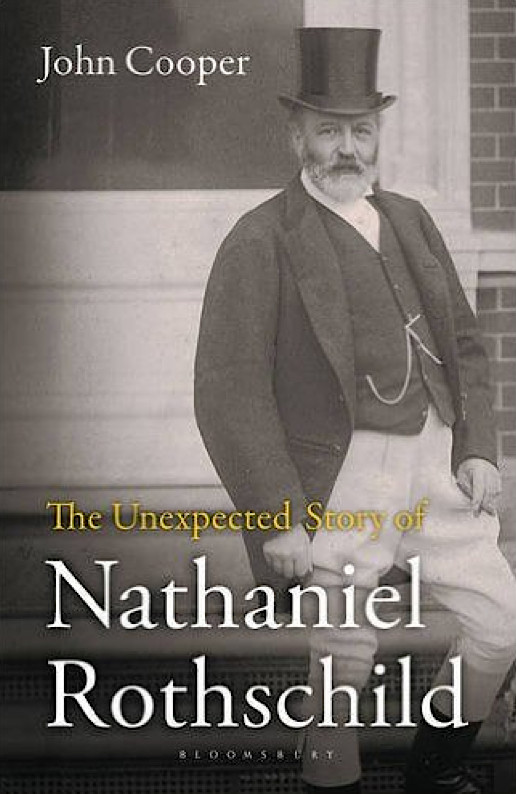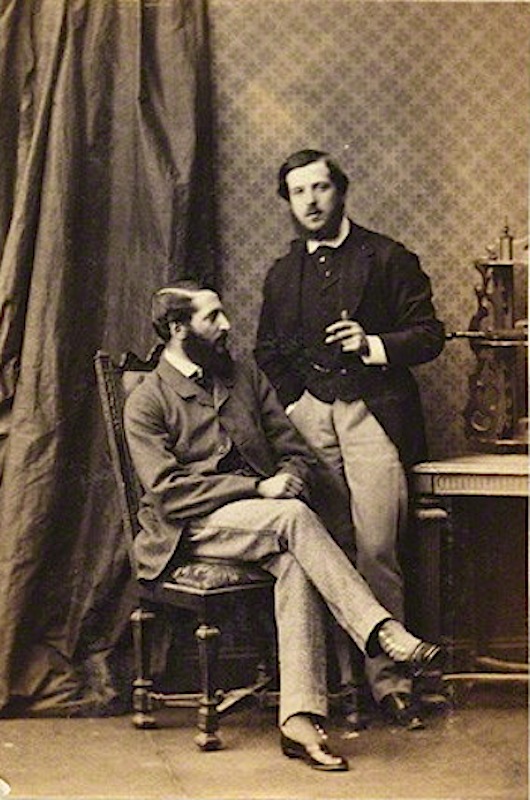Many thanks to the National Portrait Gallery, London, for permitting us to download the second image here, and to Chris Reynolds, of the informative Hertfordshire Genealogy website, for allowing us to reuse the third. Click on all the images to enlarge them. — Jacqueline Banerjee.

Cover of the book under review.
The first Lord Rothschild, known as "Natty," ordered that his papers be destroyed after his death. That may in part explain why the back cover of John Cooper's book tells us that this is his first ever full-length biography. It has come out a hundred years after his death on 31 March 1915. A few letters and papers are to be found in other archives but to an unusual degree the footnotes point to secondary sources.
The lack of primary sources is probably not the main reason for the time it has taken for such a biography to be published. Rothschild was immensely rich and well-connected but a relatively minor figure in the period and marked more by a banker's caution — in all aspects of his life — than by vision, heroism or originality. Cooper specialises in Jewish history. He was no doubt attracted to the subject because Rothschild was beyond argument a major figure in the Jewish community, first in England and then across the world.
Background and Banking Career

"Natty" Rothschild with his younger brother Alfred Charles de Rothschild, by Camille Silvy. Albumen print, 22 September 1861, NPG Ax55806 © National Portrait Gallery.
Natty was born on 8 November 1840, the first son of Lionel Rothschild who with his brothers was busy building up the family bank in London, N. M. Rothschild & Sons. Lionel had married his cousin Charlotte from Frankfurt, a pattern fairly common in the Rothschild family. In 1867 Natty kept to the pattern by marrying Emma, also a member of the family living in Frankfurt. Before that he had gone to Cambridge where he had begun a number of important friendships, not least with the Prince of Wales. In an early move which showed the caution that marked almost his whole life, he decided that it was better to leave Cambridge before taking a degree than to run the risk of failure which his tutor may have suggested was likely. He worked hard; but it may be that he would have needed to work unusually hard to be a safe bet for passing the exams.
From Cambridge he went straight into the bank as the third generation of the family. He took business very seriously but was left little room for independent action until his father died in harness in 1879. He then headed the bank for 36 years but didn't show much enthusiasm for exploiting his freedom. He worked closely with his two brothers and preferred to take on business which had been agreed by all three of them. The picture was one of gentle decline as they stuck largely to the business of loans to foreign governments which they well understood, and resisted the temptation to venture into new fields such as those opened up by the growing prosperity of the United States. Competitors were not so slow. Caution and integrity in bankers may seem more admirable to us than they did in the late 19th century. In any case, the Rothschild Bank remained both profitable and prestigious, the decline was never more than gentle and Lord Rothschild was accepted as an authoritative spokesman for the City for many years and right up to his death. He preferred to speak in private to Ministers of either party.
Political Career
Rothchild's standing with the leading politicians of the day was strengthened by his own political career, which began with his election as a Liberal MP for Aylesbury in 1865. He remained in the Commons until he accepted a peerage in 1885, thus becoming the first Jew to enter the Lords. However, he gradually lost enthusiasm for the party which had stood for removing restrictions on Jewish freedoms. His disenchantment began with the Liberals' approach to land in Ireland (he owned 15,000 acres near Tring) and was completed by Gladstone's conversion to Irish Home Rule.
Except for one brief period he pursued his political interests behind closed doors, as he did his business interests. He was enraged by the 1909 budget and by Lloyd George as the Chancellor of Exchequer. He spoke out against old age pensions and confiscatory taxation but was no match for Lloyd George as a platform orator:
You ought not to have Old Age Pensions. Why? Because Lord Rothschild was a member of a Committee that said it could not be done (Laughter). Now, really, I should like to know, is Lord Rothschild the dictator of this country? (Cheers) Are we really to have all ways of reform, financial and social, blocked simply by a notice board? "No thoroughfare. By order of Nathaniel Rothschild"? (Laughter and cheers). [245]
Still, this was an uncharacteristic episode from which he had time to recover in his remaining six years. He saw the danger of voting against the Parliament Act in 1911 and resisted the temptation. There was never any doubt about his commitment to the country in which he was born and raised despite the cousinhood across Europe. His efforts to oppose war in the days after it began to seem a strong possibility in July 1914, and before war was declared, could be seen as patriotic. Once Belgium was invaded by Germany, like many others who had seen war as undesirable, he accepted it as inevitable and spent his energies and money in the cause. He did a lot locally to encourage men to join the army and to make their lives a little more comfortable once they were soldiers. He was a very successful Chairman of the Council of the British Red Cross. Ironically, it was LLoyd George himself who described his value in the early days of the war:
I invited him to the Treasury for a talk. He came promptly. We shook hands. I said, "Lord Rothschild, we have had some political unpleasantness." He interrupted me: "Mr Lloyd George, this is no time to recall those things. What can I do to help?" I told him. He undertook to do it at once. It was done. [339]
In a newspaper article in 1915, Lloyd George again wrote in praise of his efforts:
He was prepared to make sacrifices for what he genuinely believed in. It will therefore surprise no-one who knew him to learn that he was one of those who recommended the double income-tax, with a heavier supertax, for war expenditure. He was essentially public-spirited. We need such men in this crisis, especially when they are men who have won dominating influence. [340]
As a Member of the Jewish Community
In one respect, however, Rothschild was a serious disappointment. The oddest feature of the book is the extensive space given to the concern of British and indeed world Jewry for the ill-treatment of Jews in Russia and Romania. In examining his approach to his faith, Cooper quotes him in 1912 as saying: "When I use the word "orthodox" I mean ... [those] who believe in the truths which are inculcated in the Torah and have been handed down to us for many generations. It is, perhaps, invidious to use the word "orthodox," for it is said that orthodoxy is my doxy and heterodoxy is your doxy" (198). As this implies, Rothschild was not committed to a particular narrow interpretation. He was against Zionism, contemptuous of Yiddish and very keen for Jewish refugees from eastern Europe to go almost anywhere but England. He saw the East End of London as overcrowded and as already making great demands on Jewish philanthropists — amongst whom he was pre-eminent. He opposed an attempt to create a Jewish hospital in London partly because his link with Edward VII meant that he was heavily involved in the King's Fund as its Treasurer and a great benefactor. There is no evidence that he made an effective contribution to helping potential victims of pogroms in Russia or that he even tried very hard to help. His work was always behind the scenes and it was an uphill struggle because there was a clear interest in the UK's remaining on good terms with Russia and avoiding any risk of Russia's falling into an alliance with Germany. Gradually, during his years as the leading Jewish layman in England, Jews in the USA became more and more influential, because he appeared to be, at the least, passive.
As regards Russia, over a third of the book is taken up with three chapters about it — chapters in which pages go by without any reference to Rothschild. The subject is important, there is source material and it is of interest to the author, but much of it seems misplaced in a biography of Rothschild.
Home and Family

The Rothschild family seat in Hertfordshire, in about 1913.
In his local life at Tring, Rothschild was successful. He was a model landlord and employer and, of course, could afford to be. Land, for him, was a very minor source of income. His charitable giving both locally and nationally was on a huge scale. It was by no means confined to Jewish causes. He was widely respected as Lord Lieutenant of Buckinghamshire.
He remained married but his wife is a shadowy figure in this book as indeed is his mistress. He had a long relationship with the wife of the Earl of Gosford who was the stepdaughter of Hartington, the future Duke of Devonshire who led the Liberal Unionists (including Rothschild) into alliance with the Tories. It may be that fuller treatment of wife and mistress was a casualty of the destruction of papers. He was less successful or perhaps less fortunate as a father. Walter, who inherited the title, had slight brain damage at birth and led an isolated childhood as "delicate." He went into the bank, ran up large debts, made poor business decisions and was subject to blackmail because of a wild private life. He was kicked out of the bank. Charles, the younger brother, worked tremendously hard and succeeded his father in the bank but fell ill and committed suicide in 1923.
It gradually becomes clear why it has taken a hundred years for someone to attempt a full-length biography of Nathaniel Rothschild. There might be enough material to justify a short biography of, say, 200 pages. This length, of about 350 pages, is hardly a tombstone biography, but it is still a bigger space than can sensibly be filled by what can now be known about its subject.
References
Cooper, John. The Unexpected Story of Nathaniel Rothschild. London: Bloomsbury Continuum, 2015. 384pp. £30.00. ISBN-13: 978-1472917065.
Last modified 4 September 2015